Russia's Olympic wall of security surrounds Sochi
- Published
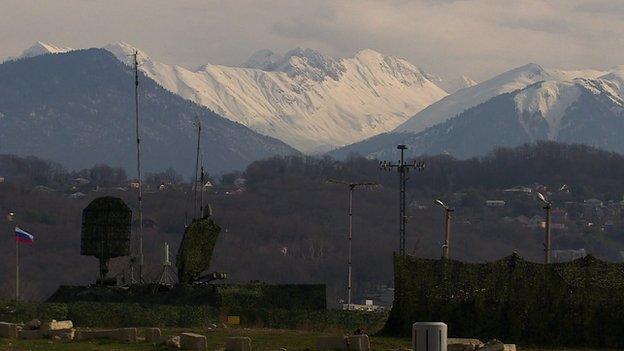
A Russian air defence system in front of mountains that will soon see Olympic action
There is only one road into Sochi from the rest of Russia - a narrow, winding road that hugs the coast.
As you drive towards Sochi along the road, you have to go through a huge concrete checkpoint in the tiny hamlet of Magri, around 60 miles (100 km) short of the city centre.
For the duration of the Winter Olympics only vehicles registered in Sochi - and those with special permission - are being allowed through the checkpoint.
We watched as every bus, truck and car was thoroughly searched by police officers with sniffer dogs. The checkpoint is being overseen by Russia's internal security service, the FSB.
Apart from the road, and the single railway line, Sochi is effectively cut off from the outside world.
It is a long coastal strip bordered by the Caucasus Mountains to the north-east and the Black Sea to the south-west.
The border crossing to Abkhazia - a region of Georgia which has declared independence - is shut to vehicles for the duration of the Games.
In the sea off the Olympic Park we spotted high-speed naval boats and a mysterious ship bristling with communications masts. Named "Seliger", it was commissioned in December 2012 and was described at the time as a "deep-sea research vessel".
The mountains are being guarded by the Russian army.
Daniel Sandford looks at some of the security measures on the ground
The Olympics are split between the "coastal cluster" of ice rinks by the Black Sea in the Sochi suburb of Adler, and the "mountain cluster" of skiing and sliding events at Krasnaya Polyana.
All along the road between the two we saw "hides" in the woods, concealing soldiers in white Arctic suits.
On some sections of the road the "hides" are placed every few hundred metres - usually a small white tent with a green camouflaged sentry tent beside it.
The army have taken over the old road up the valley from where they can look down on the new roads and railway line built for the Olympics.
The railway stations and airports have visibly higher security too.
Obvious threat
These Games will have more obvious security than any previous winter or summer Olympics.
"President Putin has said that 40,000 people from our police and armed services will be involved in securing the games," Alexander Zhukov, the head of Russia's Olympic committee explained.
"At the same time we are also doing everything to ensure the maximum security during the Games doesn't bother the spectators, the athletes, the tourists - so that it doesn't interfere with the sporting party," he said.
"In Sochi we are doing everything to ensure a safe Games but at the same time making sure this does not affect the spirit."
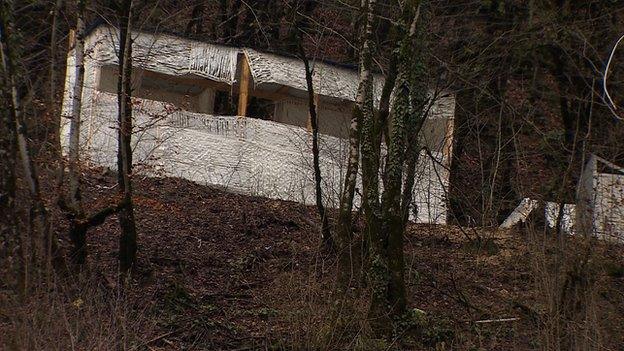
Military hides dot the road into Sochi
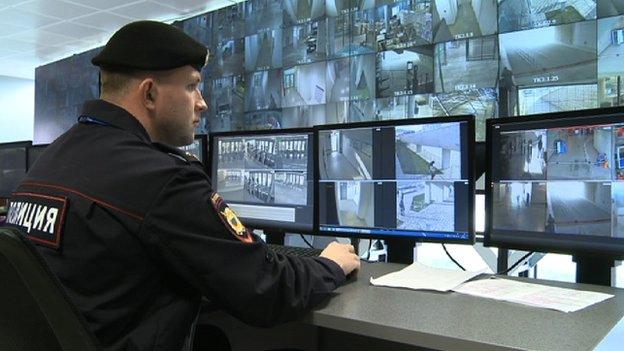
Hundreds of security cameras around the Olympic Park are being monitored around the clock
Next to the brand-new power station overlooking the Olympic Park we found a sizeable anti-aircraft battery, with two radar dishes and a cluster of vehicles loaded with missiles. But Alexander Zhukov insisted it was nothing unusual.
"I have attended a few Olympic Games, and I know that organisers always pay special attention to security. In London they even put surface-to-air missiles on roofs," he said.
"I think all of these measures are necessary to ensure safety during a major event like the Olympic Games. In Sochi a huge amount of attention has been paid to it."
The Olympic Park has its own CCTV control room with police officers monitoring hundreds of security cameras.
There is a control room for the whole city too, with another 1,400 cameras being checked day and night.
The threat is obvious.
The Games are being staged only a few hundred miles from the most violent insurgency in Europe.
The Russian Caucasus republics of Dagestan, Chechnya and Ingushetia are the focus of a revolt by militant Islamists who use suicide bombings, assassinations, and attacks on the army and police in their struggle to build an Islamic Caliphate in the Caucasus.
British security officials wrote that: "Attacks are very likely to occur in Russia in the run up to or during the Games. They are occurring irrespective of the event, particularly in the Dagestan region.
"Imarat Kavkaz (the Caucasus Emirate) is the main threat and has repeatedly expressed a desire to target the Games. In July 2013… Doku Umarov (one of the leaders of the Caucasus Emirate) called for followers to do what was necessary to disrupt them."
That thesis is supported by Professor Mark Galeotti of New York University, and an expert on Russian security.
"I think it's almost guaranteed that there will be attacks elsewhere. There may even be attacks on Sochi, particularly probing the outer rim of the security zone," Mark Galeotti warned.
"Because let's face it, if a suicide bomber drives a car into a checkpoint and explodes it - even though that's no real threat to the athletes or spectators - it still gets the headlines on Sochi."
'Safe city'
In Volgograd, one of the main cities in southern Russia, 34 people died in December in two suicide bomb attacks on successive days - at the main railway station and on a trolley bus.
The attacks were claimed - in a suicide video - by two men who said they were from Vilayat Dagestan, a group which is part of the wider Imarat Kavkaz.
They warned of further attacks including on Sochi itself.
Doku Umarov has called for his followers to do everything they can to disrupt what he called "these Satanic Games".
The attacks immediately re-awakened the security concerns surrounding the Winter Olympics.
"At the moment the rebels are winning," Professor Galeotti said.
"The rebels are getting everyone talking about security, and therefore they're turning the Games from being what Putin meant them to be - a triumph for Russia - into a story about Russian insecurity and Russian failings."
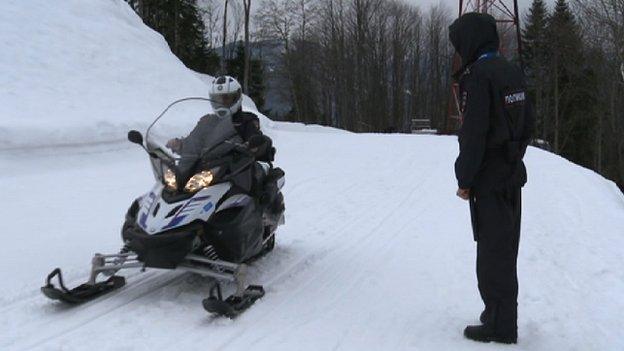
Skidoos help police keep check on the mountain slopes
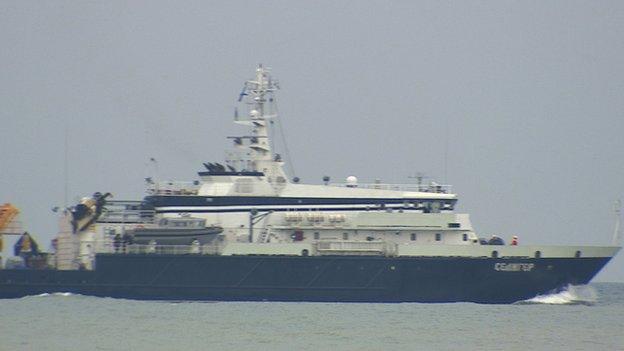
The mysterious Seliger ship is stationed off the coast of Sochi
British security officials, however, do not believe it will be so easy to attack Sochi itself.
"Volgograd shows a capability against that city but this can't translate to Sochi where Russian military operations and greater distance from Dagestan will pose a greater challenge," their assessment reads.
Alexei Navalny - the opposition leader who is one of President Vladimir Putin's fiercest critics - also thinks it is unlikely that Sochi itself will be attacked.
"I think that the security measures which are in place will guarantee security in Sochi," he said. "Of course this region isn't very stable, but in the end I'm sure that the Russian state is capable of ensuring security in the Olympic zone.
"When people hear Caucasus they think that Chechnya and Sochi are five kilometres apart. That's not the case - there's a large distance between them. You need to remember that Putin's summer residence is in Sochi, so Sochi is considered a safe city."
A safe city now guarded by 40,000 police officers and troops, at least one anti-aircraft battery and a flotilla of naval craft.
- Published27 January 2014
- Published27 January 2014
- Published21 January 2014
- Published7 January 2014
- Published30 December 2013